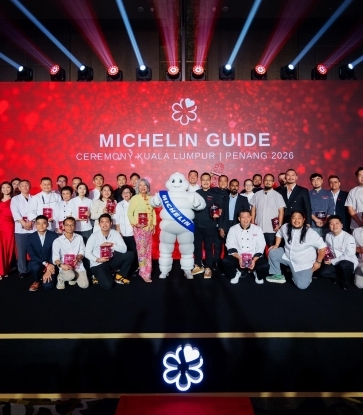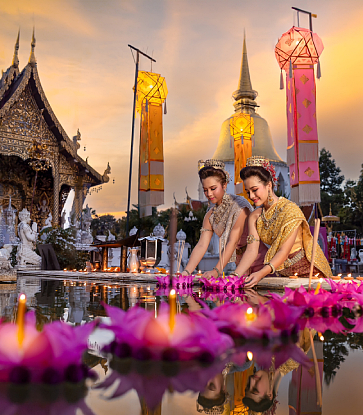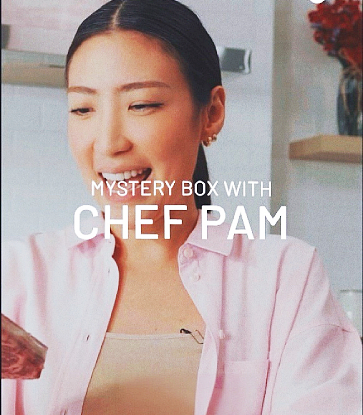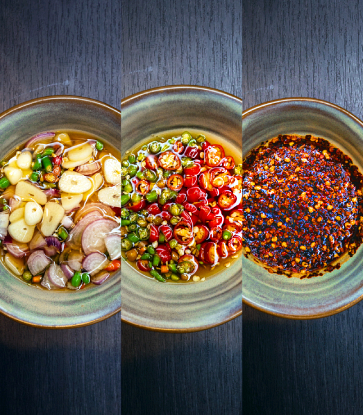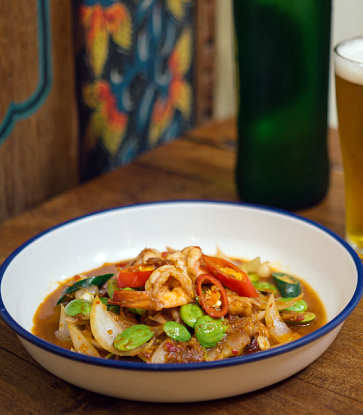Completing the trilogy on artisanal Thai cocktails, the third piece in this triptych will focus on the final four contenders who made the cut at the Mekhong Thai Spirit Cocktails 2019 competition. Sweet and demure flavours take a back seat here as Thai mixologists explore new flavours through the use of unique ingredients, namely local Thai herbs and spices. From the blend of rosella in wild honey with northern peppers in a Lahb cocktail to the flavourful and herbal notes of Roy Thai, each cocktail breaks away from the usual ingredients to offer an exotic journey into a cornucopia of local Thai flavours.
Oong-Lai—Tantitium Phuket
Oong-Lai captures the diverse culinary and cultural heritage that is unique to Phuket town. A melting pot of different cultural flavours, the local dishes of Phuket combine sweet and sour with piquant spices. One of the food that best encapsulates the harmony of local flavours is the famous local produce, oong-lai, more commonly known as the Phuket pineapple. Combining the pineapple with the flavours of Mekhong rum, Oong-Lai is a blend of mango and lime juice with pineapple syrup and egg white. The jasmine syrup provides a fragrant finishing touch of Thainess. The result is a clever balance between sweet, sour and spicy that perfectly rounds off the essence of Phuket and Thailand in a glass.

Lahb—The House Lounge, Chiang Mai
The Lahb cocktail explores the popular northern dish of larb muang—a menu popularly served during ordinations or other special occasions. It was a local belief that the sound of the knife against a chopping board is an indicator of wealth for that certain household is able to afford to buy meat for cooking. The word larb/lahb also sounds like choke-lab, which means fortune or luck in the Thai language which makes the dish a popular one during the Thai New Year—Songkran—as the Lanna people in northern Thailand believe that using meat in a larb/lahb dish between 13-14 April will bring about good fortune throughout the year. The cocktail Lahb awakens the palate with a refreshingly bright note of rosella, followed by the underlying sweetness of wild honey before ending with a unique hint of the ma-kwaen, a local pepper from the north. To add dimension to the drink, the mixologist has chosen to use another local herb, the Vietnamese coriander, which complements the herbal notes of Mekhong rum to provide a vibrant and spicy touch.

Roy Thai—Dibuka Café & Restaurant
Roy Thai celebrates the flavours of Thailand through a creative representation of local Thai herbs. This rich array includes the likes of galangal, lemongrass, kaffir lime leaves, cilantro and Vietnamese coriander, to name a few. It also showcases a range of Thai spices such as long pepper, clove, cinnamon and ma-kwaen. The mixture of herbs and spices is harmoniously complemented by the herbal notes of the Mekhong spirit to present a truly Thai flavour. The cocktail also carries a blend of a special larb syrup. With larb being such a popular Thai dish originating from the north and northeastern parts of Thailand, the Roy Thai cocktail pays homage to the local Thai flavours, making it an elegant companion that will enhance your Thai dining experience.

Kaow Niew Mamuang—The Service 1921 Restaurant & Bar, Anantara Chiang Mai Resort (150)
To say that this Thai dessert is famous would be an understatement, as kaow niew mamuang, or mango with sticky rice is well-loved by tourists and locals alike. In this cocktail, the mixologist has drawn on his own experience of seeing a long line of people queuing up for kaow niew mamuang all across Chiang Mai. The ingredients of mango, sticky rice and fresh coconut milk have become symbolic of Thai culture, just like how Mekhong rum is representative of a premium Thai spirit. Using mango purée and coconut milk, Kaow Niew Mamuang combines Mekhong rum and mango sticky rice to create this quintessentially Thai cocktail.

The best way to learn more about a country is to learn more about its culinary traditions. Not only does this include trying out the dishes but also the local produce and the unique, exotic herbs and spices that the country has to offer. However, to many untrained palates, the thought of exploring new spices can be rather daunting. Like opening a dictionary of local herbs and spices, the four shortlisted cocktails from the Mekhong Thai Spirit Cocktails 2019 competition allow diners to discover the world of local Thai herbs and spices in a memorable and exciting way.
This content was brought to you by Mekhong, Official Supplier of the MICHELIN Guide Bangkok 2019.
To know more about Mekhong : www.mekhong.com, https://www.facebook.com/mekhongthailand/



